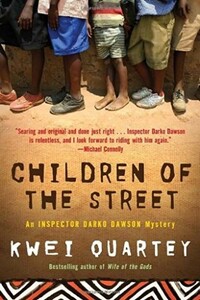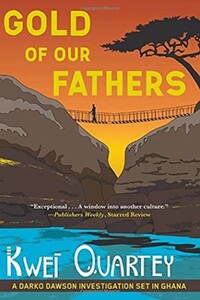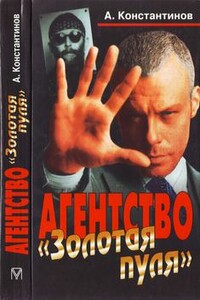Murder at Cape Three Points - [5]
“He is very good,” the matron confirmed, beaming at him.
“Wonderful.” Smith-Aidoo looked at Dawson. “Can we talk for half an hour or so? The matron will have her staff keep a special eye on Hosiah. They all adore him anyway.”
“Sure,” Dawson said. He ran his hand lightly over his son’s head. “I’ll be back soon, okay?”
Hosiah nodded. He wasn’t troubled.
Dawson thanked the matron and followed Dr. Smith-Aidoo to a private room not in use. It was comfortably air-conditioned. Two chairs were available next to the neatly made-up bed. They sat down facing each other. She crossed one elegant leg over the other. He could not help staring at her hazel eyes. They were clear and bright, but he could see a certain sadness hanging within them like clouds marring the sun.
“I’m very sorry about what happened to your aunt and uncle,” he said.
“Thank you. I’m grateful you’re taking the case. To tell you the truth, I’ve been in Accra this week to personally pressure the director general of CID and Chief Superintendent Lartey. I didn’t want to take the risk that the written petition would not be enough.”
“As you see it, Doctor, what has been the problem with the investigation so far?”
“I have nothing whatsoever against Superintendent Hammond,” she said emphatically. “I like him personally, but obviously he needs help. He has had four months and has made not even a single arrest.”
“You’re aware that there’s no guarantee that I’ll solve it either?”
“No guarantees, but I have faith in you.”
“Thank you. You were very close to Charles and Fiona, Doctor?”
Her eyes softened. “They meant everything to me. My father, Brian Smith-Aidoo, is Uncle Charles’s brother, but Auntie Fio and Uncle Charles really brought me up.”
Not uncommon in Ghana, where the extended family’s role is prominent, Dawson reflected, but in a murder case, it could be a crucial detail.
“How did that come about?” he asked.
“My mother is a schizophrenic,” she said matter-of-factly. “By the time I was eight, she had become so violent that my father could barely manage her. She particularly picked on me. Once she almost strangled me, and on another occasion she fractured my forearm by twisting it.” She winced, as if she were living through the experience again. “My father asked Uncle Charles and Auntie Fio if they would take care of me for a while. He kept my brother, Trevor, with him. Eventually he had my mother institutionalized at a psychiatric hospital in Manchester.”
“Manchester? Why there?”
“It’s her hometown. My mother is English. No way her family, or my father for that matter, would put her in the psychiatric hospital in Accra.” She grimaced. “Have you ever been inside there?”
“Once, while on a case.”
“Then you know how deplorable the conditions are. To say it’s medieval would be too kind. After my mother was sent to England, Daddy wanted me back, but by then I was almost thirteen and so attached to Auntie Fio and Uncle Charles, and vice versa. They didn’t want to give me up.” She shook her head with regret. “I believe that’s when the rivalry between Uncle Charles and my father started. Uncle Charles was protective and possessive of me. In the five years I was with him, Daddy didn’t come around that much, and so my uncle asked him in effect, ‘Where have you been all this time?’ ”
“Did you return to your dad?”
“Physically, but not in spirit. I was miserable with him. He didn’t give me a fraction of the love and warmth that Auntie Fio and Uncle Charles had given me. By fifteen, I was acting out-misbehaving, smoking, and all that mess. I was at Accra Girls’ High, and the headmistress told my father that if I didn’t straighten out, she would expel me. Again, he turned to Auntie and Uncle for help. They took me out of boarding and made me a day student. Uncle Charles took me to school every single day and Auntie brought me home when classes were over, keeping me in check, and yes, I did straighten out.”
“You must have,” he said. “You’re a doctor now.”
She smiled, clearly glad that her fate had been shaped this way. “All due to Uncle Charles and Auntie Fio. And I tell you all this not to bore you with my life story, but to show why they were so important, so precious to me.”
“I understand now. You said your father and his brother became rivals. This is a tough question, and I’m sorry to ask it, but I have to. Could your father have had anything to do with the murder of your aunt and uncle?”
“He doesn’t have passion or courage for anything, let alone murder. Seems odd to put it that way, but there it is.”
Doesn’t think much of her dad, Dawson thought but then neither did he of his.
“How did he react to your uncle’s death?”
“He was devastated. He went into deep mourning, as did I. This has been the most awful year of my life. Only two months before my uncle’s murder, another tragedy took place. You should know about it because it might have some bearing on the case.”
She slumped very slightly, as if a heavy load had been set upon her shoulders.
“Jason Sarbah is a name you will become familiar with,” she continued. “After Uncle’s death, Jason became the new director of corporate affairs at Malgam Oil. Uncle was Jason’s first cousin-same grandmother, Bessie Smith, but different grandfathers. Bessie was first married to a Tiberius Sarbah, whom she divorced for Robert E. Aidoo, which is how the Smith-Aidoo surname came about. Bessie gave the hyphenated name to Simon, her only son by the second marriage.”

"Searing and original and done just right… Inspector Darko Dawson is relentless, and I look forward to riding with him again." – Michael ConnellyIn the slums of Accra, Ghana's fast-moving, cosmopolitan capital, teenagers are turning up dead. Inspector Darko Dawson has seen many crimes, but this latest string of murders – in which all the young victims bear a chilling signature – is the most unsettling of his career. Are these heinous acts a form of ritual killing or the work of a lone, cold-blooded monster? With time running out, Dawson embarks on a harrowing journey through the city's underbelly and confronts the brutal world of the urban poor, where street children are forced to fight for their very survival – and a cunning killer seems just out of reach.

Darko Dawson, Chief Inspector in the Ghana police service, returns in this atmospheric crime series often compared to Alexander McCall Smith's The No. 1 Ladies' Detective Agency novels.Darko Dawson has just been promoted to Chief Inspector in the Ghana Police Service – the promotion even comes with a (rather modest) salary bump. But he doesn't have long to celebrate because his new boss is transferring him from Accra, Ghana's capital, out to remote Obuasi in the Ashanti region, an area now notorious for the illegal exploitation of its gold mines.When Dawson arrives at the Obuasi headquarters, he finds it in complete disarray.

«Золотая пуля» — так коллеги-журналисты называют Агентство журналистских расследований, работающее в Петербурге. Выполняя задания Агентства, его сотрудники встречаются с политиками и бизнесменами, милиционерами и представителями криминального мира. То и дело они попадают в опасные и комичные ситуации.Первая книга цикла состоит из тринадцати новелл, рассказываемых от лица журналистов, работающих в Агентстве. У каждого из них свой взгляд на мир, и они по-разному оценивают происходящие как внутри, так и вне Агентства события.Все совпадения героев книги с реальными лицами лежат на совести авторов.

В книге рассказывается история главного героя, который сталкивается с различными проблемами и препятствиями на протяжении всего своего путешествия. По пути он встречает множество второстепенных персонажей, которые играют важные роли в истории. Благодаря опыту главного героя книга исследует такие темы, как любовь, потеря, надежда и стойкость. По мере того, как главный герой преодолевает свои трудности, он усваивает ценные уроки жизни и растет как личность.

В книге рассказывается история главного героя, который сталкивается с различными проблемами и препятствиями на протяжении всего своего путешествия. По пути он встречает множество второстепенных персонажей, которые играют важные роли в истории. Благодаря опыту главного героя книга исследует такие темы, как любовь, потеря, надежда и стойкость. По мере того, как главный герой преодолевает свои трудности, он усваивает ценные уроки жизни и растет как личность.

О них, о братьях наших меньших. Собачий детектив. Рассказ опубликован в киевском журнале "Детектив+" (№ 1-2006)

В книге рассказывается история главного героя, который сталкивается с различными проблемами и препятствиями на протяжении всего своего путешествия. По пути он встречает множество второстепенных персонажей, которые играют важные роли в истории. Благодаря опыту главного героя книга исследует такие темы, как любовь, потеря, надежда и стойкость. По мере того, как главный герой преодолевает свои трудности, он усваивает ценные уроки жизни и растет как личность.

В книге рассказывается история главного героя, который сталкивается с различными проблемами и препятствиями на протяжении всего своего путешествия. По пути он встречает множество второстепенных персонажей, которые играют важные роли в истории. Благодаря опыту главного героя книга исследует такие темы, как любовь, потеря, надежда и стойкость. По мере того, как главный герой преодолевает свои трудности, он усваивает ценные уроки жизни и растет как личность.